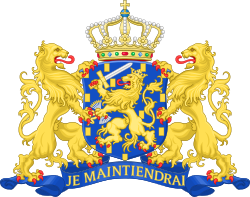| Ministerie van Justitie en Veiligheid | |
 | |
 Current headquarters, the JuBi Building complex | |
| Department overview | |
|---|---|
| Formed | March 12, 1798 |
| Jurisdiction | Kingdom of the Netherlands |
| Headquarters | Schedeldoekshaven 100, The Hague, Netherlands |
| Employees | 30,000 |
| Annual budget | €11.1 billion (2018) [1] |
| Minister responsible |
|
| Deputy Ministers responsible |
|
| Website | Ministry of Justice and Security |
The Ministry of Justice and Security (Dutch : Ministerie van Justitie en Veiligheid; JenV) is the Dutch ministry responsible for justice, imprisonment and public security. The ministry was created in 1798 as the Department of Justice, before it became in 1876 the Ministry of Justice. In 2010, it took over the public safety duties from the Ministry of the Interior and Kingdom Relations and became Ministry of Security and Justice. In 2017 the ministry was renamed to Ministry of Justice and Security.
Contents
On 1 March 2020, future prime minister of the Netherlands Dick Schoof became secretary-general of the Ministry of Justice and Security, the most senior non-political position within the ministry. [2] [3] [4] [5] In his role, he was involved in negotiations on asylum reform. Upon reaching the legal retirement age in March 2024, Schoof chose not to retire and was granted an exemption to continue working for three more years; however, that year he became prime minister. [6]
The ministry is headed by the Minister of Justice and Security, Foort van Oosten (VVD) since 5 September 2025.
| This article is part of a series on |
| Politics of the Netherlands |
|---|
 |
